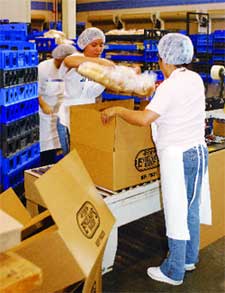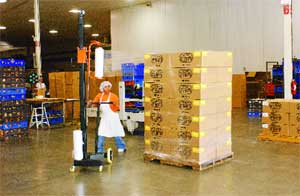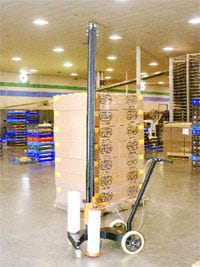Bakery's portable stretch wrapper saves dough
March 11, 2015
John Murphy, general manager of Engelman's Bakery in Norcross, GA, needed a better way to wrap his pallet loads of bakery products. "Our case loads weren't getting wrapped as quickly or as well as they should have been," Murphy explains. "We were wrapping them by hand, which meant we were wrapping inconsistently."
Murphy frequently observed his packing department employees struggling to manually wrap the seven-case-tall, 61/2-ft-high pallets with 18-in.-wide, 1,500-ft-long rolls of 80-ga conventional hand-wrap film.
"We have a lot of small ladies working in our packing department, and the wrapping process is somewhat physical," he says. "So if they don't do a good job in wrapping, the cases of product tend to shift and get damaged when the pallets are moved." Also, pallet loads would often sit for hours, waiting for employees who had an easier time wrapping the pallets to do the work.
|
Operators manually case-pack film-wrapped bread coming off two packaging lines. |
When Murphy researched fully automated stretch-wrapping systems, he could not justify the expense. Plus, he needed a stretch wrapper that was portable, meeting the company's need to move the stretch-wrapping process directly to the pallets of product coming off of two lines–one for sliced, and one for unsliced product–rather than transport the pallets to the stretch wrapper.
Rising to the challenge, a portable stretch-wrapping system from GaleWrap, an ITW co., met Murphy's cost and flexibility requirements, while providing consistent, securely wrapped pallet loads.
Hand wrapping is a half-baked solution
A privately owned, single-location bakery, Engelman's 50,000-sq-ft plant produces more than 160 different types of breads, rolls and buns, many of which are frozen for distribution. The products are made primarily for restaurants throughout the southeast, as far west as Salt Lake City, and north into Pennsylvania. The company also delivers a small line of fresh product to Atlanta-area restaurants and foodservice operators. Engelman's 60 employees work during two shifts, six days a week. That production schedule, coupled with the broad distribution area, means the packing department wraps up to 20 pallets per shift.
Murphy observed that the cases of product suffered the least if they were wrapped as soon as they came off the packing line and were staged on a pallet. "When the cases of product were getting moved around unwrapped–especially on a forklift–they were getting damaged, and the bottom cases could get crushed," he explains. This meant that the pallets of product had to be completely unloaded, and the affected products removed from damaged boxes and repacked into new ones. This wasted both packing supplies and time.
|
The stretch-wrapping system's film carriage evenly distributes the oriented film in a spiral around the pallet load. |
Worse, Murphy had heard from other warehousing managers along the supply chain that the cases on the pallets were sometimes arriving to the customers in less-than-perfect condition. "Once the pallet leaves our facility, I have no control over what happens to it as it travels through other warehouses," says Murphy. "We needed something that did a better wrapping job than conventional hand wrap."
Portable system means no case loafing
So, when Murphy learned about the GW-1 GaleWrap Walker wrapping system, he ordered one immediately and put it in his warehousing area right at the end of the packing lines. "I'd never seen anything else like it," Murphy explains. "The GaleWrap Walker system allows anyone in the packing department–or even anyone in the plant–to properly wrap a pallet to better-protect our product cases during shipping."
The GW-1 system includes a fully portable, semi-automated walker device that the operator pushes around the staged pallet. The stretch-wrap system's film carriage evenly distributes the GaleWrap oriented film in a spiral around the pallet load. As the film is unwound from the carriage and applied to the load, the appropriate level of constant tension is applied to the film for maximum wrapping efficiency and minimal film waste. Engelman's Bakery uses 18-in., 2,000-ft/roll GaleWrap film.
"What the GaleWrap system does for us more than anything else is help to protect our product," says Murphy. The better-wrapped the product and pallet are before they're moved, the less they get knocked around and the less the product suffers."
|
The system includes a portable, semi-automated walker device that the operator pushes around the staged pallet. |
Because of the GaleWrap stretch-wrap system's location at the end of the packing lines, Engelman's warehousing staff has also increased its efficiency. Since anyone can operate the GaleWrap Walker, the pallets are wrapped immediately upon staging. "Now our shipper doesn't have to come back to packing to wrap everything," says Murphy. "It streamlines our process. The shipping department employees can just put the pallets away, which also enables us to take better care of the product."
Murphy has also noticed that the GaleWrap system prevents film waste because the film's hemmed edge prevents tearing and binding. "Other shrink wraps we've used would tear off or wind up like a barbershop pole, and we'd have to pull it apart and apply it again," he explains. "The GaleWrap film is different."
GaleWrap film is manufactured in a special process that yields a material that only necks down 5 to 7 percent from its original roll width, reducing the number of revolutions required to wrap a load. The film is oriented, which is different than conventional prestretched films due to a patented manufacturing process that makes GaleWrap a lighter-weight roll than conventional hand wraps. The post-wrap contraction attribute of the film increases load containment and eliminates the possibility of damaged goods, because loads are wrapped tighter.
Stretch wrapper leavens the load
Finally the GaleWrap system has another added benefit that Murphy didn't anticipate: ergonomics. All the packing department employees have experienced less strain and fatigue using the GaleWrap. "We never had an injury using conventional hand-wrap film, but I've certainly seen less strain and stress on the employees since they've begun using the new machine," he explains.
"I'm a baker," Murphy concludes. "My goal is to get the products to the end user in as good of shape as we possibly can. The GaleWrap helps us take care of our product, which helps us take care of our customers, and that's the most important benefit of all."
More information is available:
Stretch wrapper: GaleWrap, an ITW co., 866/GALERAP. Circle No. 205.
About the Author(s)
You May Also Like





